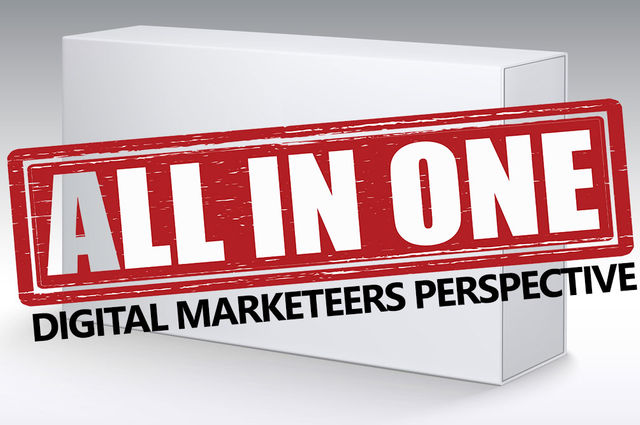Why are there so many hospitality technology vendors in our industry? (Part I)
12 experts shared their view
(Digital Marketeers Perspective) Some hoteliers are rightfully disoriented in the current myriad of hospitality technology vendors and solutions and are dreaming of a one-stop-shop tech solution that will cover all of their PMS, RMS, CRS, Channel Manager, CRM, CMS and DMS needs. The question is, 1) is the one-stop solution already here?, 2) Will a future one-stop-shop solution be viable enough vs the current multitude of specialist hotel technology vendors... or 3) Will we never see such a solution.... and why? (also have a look at IT Professional Perspectives on this topic)
Some solutions may define themselves "One-Stop" but in fact, the market seems not to be offering the final solution for the hoteliers. This is mainly due to the constantly changing/upgrading demand in terms of software features and integrations and the still consistent offering of tailor-made products. In addition, the raising of vacation rental has somehow re-shaped the hotelier demands and standards making the whole scenario even more complex.
In the future, the viability of a one-stop solution may be depending on the merge or two or more big complementary players. This may help them - perhaps via a modular offer - cover all the customer requirements and get really close or even achieve what can be defined as a real one-stop solution.
"The days of Leonardo da Vinci," scientist Etienne Wenger wrote in an interesting essay, "are over." According to Wenger's theory, "today's complex problem-solving" requires multiple perspectives, rather than centralized approaches. Our industry, of course, is no exception. The days of the we-are-a-PMS company-but-kinda-offer-a-booking engine-as-well-kind-of-vendors (not dissimilarly to Da Vinci's), are long gone; because, In order to be (really) scalable and innovative, technologies must be as agnostic and decentralized as possible. Hoteliers should feel free to choose (and/or replace) part (or all) of their tech stack as they please, rather than being bound by one single, monolithic, centralized, vendor that tries to do everything.
James Surowiecki, in his classic text, The Wisdom of Crowds, elegantly demonstrated how hyper-specialized knowledge is crucial for innovation, so instead of chasing this all-in-one chimera, we should let different providers focus on their respective niches: so -please- let PMSs be PMSs and IBEs be IBEs.
The bottom line is that the industry must focus on what's really important: creating a micro-service architecture, cloud-native, open API-driven landscape. If we get there, hoteliers will, finally, be in control, rather than being controlled by their vendors, and we'll eventually get out of the 20th century...
I believe hoteliers are not equipped well to manage dozens of vendors handling different aspects of their DMS (Digital Marketing Services) initiatives. A hotel client of NextGuest Digital was working with 28 DMS vendors before we stepped in! Hoteliers must realize that DMS is what determines the success of the property's direct booking channel. To maximize direct bookings, hoteliers should be working with a specialized full-service DMS agency to handle all of DMS interconnected components: SEO, SEM, metasearch, online media, website CMS, content marketing, CRM marketing, etc. As far as DMS is concerned, a one-stop full-service agency is the answer. The whole is greater than the sum of its component parts as opposed to diluting the DMS effort by slicing it into smaller fragmented pieces handled by different vendors.
This trend has nothing to do with the Hospitality Industry. Across all industries, there has been an explosion in 'apps' that companies use. The average small business now uses well over 50 apps. A few years ago that might have been 5-10. The reason for the explosion is the reduction in the cost of starting a company and the ease of distribution (companies can sell apps globally from day 1).
These shifts in market dynamics (plus much VC cash) make it possible to build an application that serves niche uses profitably for both a vendor and a customer. The balance has shifted against older vendors built on legacy tech: it's almost impossible to keep up with an accelerating influx of innovation. I used to get all my TV from four channels. Life was simpler then. But the quality and volume of content was woeful when compared to what we have today. The one-stop-shop is dead.
Is there a magic bullet out there for hoteliers? is there some sort of techno-wizard that will in a 'poof' eliminate your need for multiple (often futile) integrations and IT resource back-ups? The answer is NO, and thank goodness! We all know that the hospitality world is desperate for solutions...solutions that work to build our revenue and reduce costs. Let the market decide which technology is best. Rejoice in the fact that so many different companies are devoting resources to our industry. Competition breeds better products and ultimately, better business for both the vendors and the users. For one, I hope we never see the dominance of one technological solution. WE need the 'better mousetrap' and will not get it if the market is closed to innovation.
All-in-one is not the choice because the tech needed is very fragmented and specialised. Online distribution is a matter of high-level tech where hotels should compete with OTAs; These have the geek pedigree required to survive in this space. Operational technology needs to be highly sophisticated, so it's improbable that an all in one solution may be compelling enough. Nowadays, the level of technology for the hotel industry is already incomparable with the tech tools used by OTAs. If we may go in the direction of software pretending "to do everything", that tech gap would be more significant. The hotel industry is not a core tech business just as WeWork is substantially a real estate corporation. Hotels should focus on getting the best tools they need for their operations as soon as they realize where they need technology, for what purpose and at what cost. Open APIs among software should be "the law" to let the single tools operate with others in a connected ecosystem.
There are so many vendors in the industry for a number of reasons - Travel & Hospitality are 'it' Industries with high visibility at the moment; there is a wealth of speculative capital; technology development has become swifter through modern tools and platforms; the industry is perceived as ready for disruption; there remain many operational functions that are yet to be technology enabled; perhaps the industry wants something different......?
Now for the questions.
1. Yes, there are number of solutions that go well beyond the range in the question to encompass almost the entire hospitality operation.
2. Yes, it is. There will always be some parts of the operation/technology that will sit outside of this model. Revenue Management is a good example as it will receive input from so many other systems in the future. However, the rest of the operation has proven to be a good candidate. This is because when the hospitality operation is viewed in this context it is found that process and inputs are similar across the business. This is why a single platform is viable.
In my view the term 'specialist hotel technology vendor' is loose. Given the right resources and commitment it's realistic to be strong at multiple disciplines. If through the acquisition of multiple disparate companies/products a vendor becomes 'strong' and celebrated why would it not be the case that through integrated technology you can also become strong? Is the cut and thrust of mergers and takeovers more interesting than big picture industry technology solutions? It appears to be the case in media dialogue and pundit world.
3. We've seen it and it is alive in the industry. Nothing new here.
Having direct experience on this topic as an operator and a vendor to industry, it is not as much about the technology as it is about the organisational drive and courage to make such a major shift in business process. When the commitment is made and the step is taken the rewards are huge. Not achievable through any other mix and match of multi vendor solutions. But you can only appreciate that if you've walked the road. Few have.
This will be the eventual way the industry runs as a standard because it is the only approach that addresses the real business pressures of industry. Perceived technology pressures that many like to cite are secondary concerns.
This is not a question about one vendor or multiple or one stop solutions. Hoteliers are confused because everyone tells them a different story about how they are more important than the rest. On top, it is about the inconvenience and extra charges when dealing with multiple vendors. So are market places the answer? Absolutely not. It just adds to the confusion as the fundamentals are not dealt with.
According to Phocuswright's State of Travel Startups report, about 2,000 travel tech startups have been founded globally since 2008 and 900 of those were created just between 2012-2014. No wonder hoteliers are feeling overwhelmed by choice and promises of the next “must-have” technology.
Right now, a hotel's commercial operations are often siloed. They operate as distinct disciplines: marketing, revenue, sales, data management and they use different, sometimes contradictory technology. Some smart operators have identified this shortcoming and are moving towards a more centralized commercial approach, perhaps driven by trends like metasearch which blur the lines of distribution and marketing.
I don't think we're anywhere close to a true all-in-one solution. The balance for all-in-one versus niche technology providers will often come down to how many vendors you are capable of managing. Each one will come with a platform, a client services team and require time to manage. A strategic view should be taken, what are the property's commercial and revenue goals and what technology stack is needed to achieve those goals? There's certainly an opportunity for hotels to consolidate to fewer providers and to concentrate on tech that can demonstrate a positive impact on the property's commercial goals. This is especially true as industry growth slows in 2020 where there's likely to be greater emphasis on cost control and management of budgets and capital expenses.
I believe that there are providers of technology in our industry today that come very close to being a "one-stop shop". The challenge is not necessarily with the technology vendors horizontal capabilities but the hesitance of our industry to migrate away from legacy systems. Also, the big bang effect, of taking out all of a hotels current primary systems and replace them with a single solution is an extremely scary prospect for any hotel or hotel company to consider.
There are easily more than half a million hotels around the world, so there are naturally thousands and thousands of hotel tech suppliers servicing them. At the lower end of the scale, under 50 rooms, there are several suppliers who do indeed provide an 'all-in-one' solution, as defined by the basic requirements of that market segment. However, those basic requirements don't scale to the more advanced and detailed needs of larger hotel businesses.
Opera Hospitality became a global hotel tech giant when the American MICROS point of sale business bought the European Fidelio PMS business, however, they still don't have an all-in-one solution - but they could quite easily acquire the missing components one day - particularly as the parent company Oracle are already strong in ERP and CRM solutions.
As the hospitality tech market matures and undergoes more consolidation, we can expect larger all-in-one suppliers to emerge, however, there will always be specialists in certain product categories, referred to as 'best-in-class'. The decision for the hotelier will then be a choice between the benefits of a 'one-stop-shop' versus integrating 'best-in-class' solutions. This is the same decision that businesses in other industries face today.
The IT infrastructures of hotels/chain are so complex and each of them being unique, a solution that would be flexible enough to match each hotels needs as well as complex enough to integrate historical data and easily plug-in those complex systems would be very (very) costly.
This would also cause of the problem of stability and security. When deciding to work with only one partner, hotels increase their exposure to any IT malfunctions but also to the dominance of one provider over all of your data and distribution. So as long as the software works and the relationship with the provider is good, then it is no problem. But if one of those two pillars starts failing, then the risk becomes immense.












